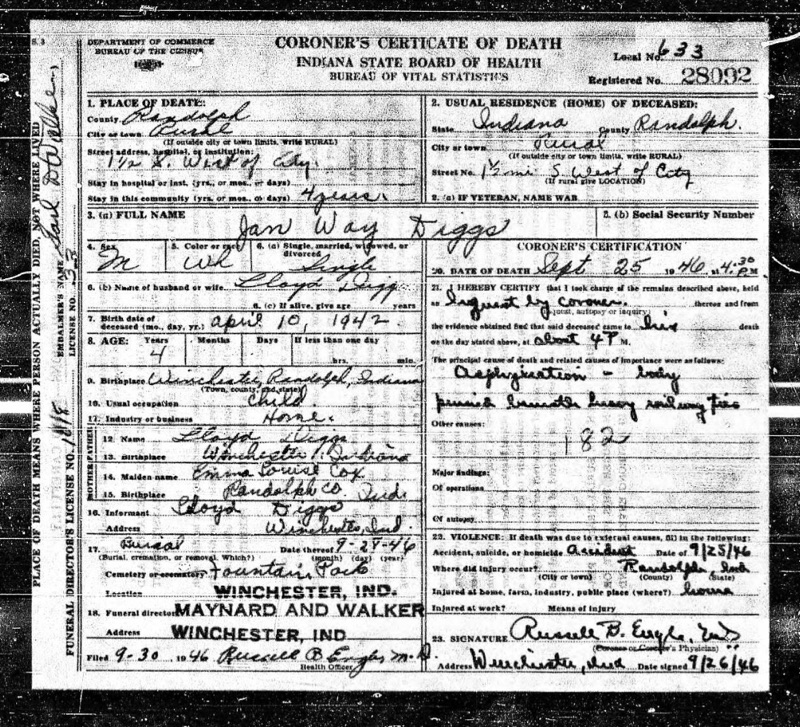From An Article By R. Allen Price.
In the 1920's, anyone who was a patriotic, native-born, white Protestant American citizen over 18 years of age could join the Ku Klux Klan. All he had to do was pay a $10 initiation fee, and $6.50 for the robe and hood.
The Indiana Klan was very strong in Evansville, Kokomo and Indianapolis. Locally, the Klan was active in Richmond and Portland. By 1925, there were 500,000 Klansmen across the state.
There is a man in Winchester who tells of an encounter he had with the Klan. It seems he was interested in finding out about the KKK. He'd heard they were a patriotic, white-Protestant organization. The thought appealed to him, but he was suspicious of the fact that people he was sure were members would not admit to any involvement. Why would that be, he wondered. Finally, after hounding fellows enough about information on the Klan, he was told to go to a hotel in Richmond, that a fellow there could tell him all he wanted to know.
 With his father, the young Winchester man went to Richmond and to the hotel they'd been told of. A man in the lobby told them the man they wanted to see was upstairs, and gave them a room number. Father and son made their way up the steps and toward the designated room.
With his father, the young Winchester man went to Richmond and to the hotel they'd been told of. A man in the lobby told them the man they wanted to see was upstairs, and gave them a room number. Father and son made their way up the steps and toward the designated room.Outside the door they were met by a man wearing a sidearm who stopped them and asked their intentions. They told him they were interested in joining the Klan but wanted some information. The guard told them to step inside, that the man in the room could give them all they needed to know.
As the younger man tells the story, the first thing they saw when they went into the room was a large family Bible, laying open on a table. On the Bible lay a .38 caliber hand gun.
As the story goes, the Winchester man found the Bible and the gun as symbolic of two things highly different from one another. They also found that the man they'd gone to see would tell them nothing of the organization until they promised to become members and went through the initiation ceremonies. They declined the invitation.
In 1924, a young Winchester lawyer was seated behind the desk in his office when there came a knock on the door. It was a man named Talbert. The attorney asked him in and offered him a chair.
"What can I do for you," the lawyer asked.
I'm here to tell you about an organization I think you'll be interested in," replied Talbert.
The organization the man referred to was the Ku Klux Klan. He was in Winchester as an organizer. The lawyer listened intently as the soft spoken Talbert explained to him what the Klan was, and urged him to join. Finally, the young man had heard enough.
"I don't think I'm interested in joining your organization," said the lawyer.
"Well, let me tell you this," said Talbert. "If you don't join, your future as a lawyer is very much in doubt."
Along with the threats, there were also KKK parades in Winchester in the 1920's when the Klan was at peak strength. Wearing white robes and tall, pointed white hats they marched through the streets. Local people who remember those parades have admitted that they were frightening, but perhaps more frightening than the Klan's appearance, was the Klan's anonymity. They were sworn to tell no one of their membership, not neighbors or closest friends. For that reason, there was suspicion and fear aroused by the Klan.
Another man who has told me of the KKK and their demonstrations in Winchester, however, said the Klan here wasn't really too much of a threat.
"They used to parade around here," he said, "and they had on those pointed hats and robes clear down to the ground, and they looked strange. But mostly they just wanted to parade around."
He told me that he remembered hearing talk of prejudice against blacks, Catholics and Jewish people but said there wasn't too much kindling in Randolph County for the Klan's fire because he could only remember there being very few negro, Catholic or Jewish families around. but he added; "Anyone who had a prejudice against anyone could be a member." That man also told me that the Klan in Winchester was defeated by having been ignored as much as anything, and that they were hurt by the fact that people didn't take them seriously.



.jpeg)

No comments:
Post a Comment